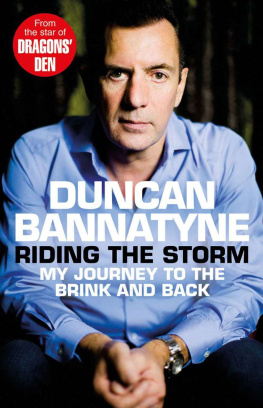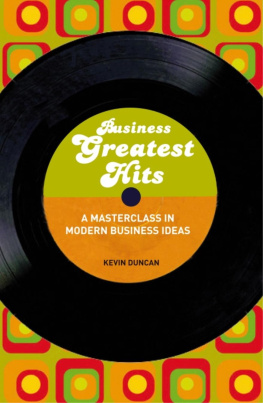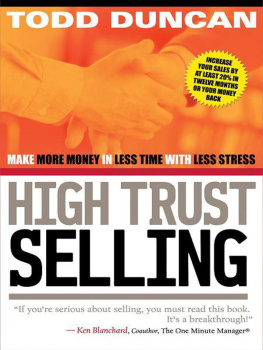Duncan Bannatyne - 37 Questions Everyone in Business Needs to Answer
Here you can read online Duncan Bannatyne - 37 Questions Everyone in Business Needs to Answer full text of the book (entire story) in english for free. Download pdf and epub, get meaning, cover and reviews about this ebook. year: 2012, publisher: Headline, genre: Politics. Description of the work, (preface) as well as reviews are available. Best literature library LitArk.com created for fans of good reading and offers a wide selection of genres:
Romance novel
Science fiction
Adventure
Detective
Science
History
Home and family
Prose
Art
Politics
Computer
Non-fiction
Religion
Business
Children
Humor
Choose a favorite category and find really read worthwhile books. Enjoy immersion in the world of imagination, feel the emotions of the characters or learn something new for yourself, make an fascinating discovery.

- Book:37 Questions Everyone in Business Needs to Answer
- Author:
- Publisher:Headline
- Genre:
- Year:2012
- Rating:5 / 5
- Favourites:Add to favourites
- Your mark:
- 100
- 1
- 2
- 3
- 4
- 5
37 Questions Everyone in Business Needs to Answer: summary, description and annotation
We offer to read an annotation, description, summary or preface (depends on what the author of the book "37 Questions Everyone in Business Needs to Answer" wrote himself). If you haven't found the necessary information about the book — write in the comments, we will try to find it.
37 Questions Everyone in Business Needs to Answer — read online for free the complete book (whole text) full work
Below is the text of the book, divided by pages. System saving the place of the last page read, allows you to conveniently read the book "37 Questions Everyone in Business Needs to Answer" online for free, without having to search again every time where you left off. Put a bookmark, and you can go to the page where you finished reading at any time.
Font size:
Interval:
Bookmark:
Duncan Bannatyne is one of Britains best-known entrepreneurs thanks to his appearances on Dragons Den. A regular investor in new companies, he is chairman of the Bannatyne Group, which owns and operates hotels, health clubs, spas and bars. In 2011, the Sunday Times Rich List estimated his personal worth at 430 million, having started his business career with an investment of 450 in an ice-cream van. His first book, Anyone Can Do It, was a Sunday Times bestseller in both hardback and paperback and has sold in excess of 200,000 copies. He has six children, and homes in London, the North East of England and the south of France.
Duncans blog can be found at www.bannatyne.co.uk or you can follow him on Twitter at twitter.com/duncanbannatyne
Jo Monroe , who has worked with Duncan Bannatyne on all his books, is a ghostwriter and journalist who has written for The Times, the Guardian and Time Out.
Her website is www.jomonroe.com
First and foremost I would like to thank my children Abigail, Hollie, Jennifer, Eve, Emily and Tom, as well as my grandchildren Ava and Austin. Thank you and I love you all so much.
I would like to thank Jo Monroe for working with me for a sixth time; it has been an absolute pleasure. Thanks also to John Moseley, Jonathan Taylor and the team at Headline Publishing and Jonny Geller at Curtis Brown; your help with this book has been invaluable.
A big thank you to everyone.
43 Mistakes Businesses Make... and How to Avoid Them
ITS AMAZING HOW MANY BUSINESS OWNERS AND departmental managers cant answer this question. It doesnt matter whether youre in retail or the service sector, every business sells things and if you want your business to succeed, you need to know what you sell the most of.
Take my hotel business as an example. I need to know if I sell more weekend breaks or more midweek breaks. I also need to know if I sell more chicken or fish dinners in our restaurants. And in our spas, I need to know if people are ordering more massages or more manicures. Why do I need to know these things? Because if I can work out why one product is selling better than another, then I can use that information to a) sell more of it, but b) sell more of everything else too.
To work out your bestselling line, you first have to get hold of accurate sales figures for each of your products and/or services. Its amazing how many businesses never bother to find this information out, relying instead on hunches and anecdotes. Its usually because they dont have the right systems in place for collecting the data, which means getting accurate figures is so time-consuming they never bother. Their sales data sits on individual desks or computers and is never properly collated. Or they might have an order book and a sales chart but never compare the two. Every manager has their sales data somewhere in their system but some have to look harder for it than others. Which means that if you run or are employed by a business that doesnt harvest and process this kind of data properly, you can engineer an easy win for yourself by being the person who puts new data-collection systems in place. If you become the person who collects this information, you will find you soon have a great deal of power within your organisation.
Once youve got your sales data, you need to analyse it to work out why one line sells better than another. Generally, consumers make their purchases based on one of four things: price, quality, service and convenience. However, other factors like fashion, branding, money-off coupons or a persuasive sales pitch can also make a difference. You need to scrutinise the data to look for correlations between your sales figures and other factors. For instance, look to see if there is a relationship between a recent advertising campaign and an uptake in demand, or if certain products sell well in certain price brackets. Perhaps youre selling more of something because it is prominently displayed, either on your home page or on your shop floor. Depending on your business, you might also look to see if you sell more at the end of the month, or the beginning of the day, or during the school holidays.
Your data should also tell you how you get most of your sales online, in person, over the phone, or maybe through an affiliate. This can help you target your resources to clinch future sales, and the further you burrow down into the data, the more information youll find to help increase sales. The more data you collect, the more useful it will be: gathering sales figures over time lets you spot trends and can tell you if youre selling more of a particular product than you did this time last year, or if your sales are declining.
Once youve spotted these patterns and correlations, the next step is to ask yourself why your sales data is telling you these things. The correlation between an advertising campaign and a spike in sales is pretty bloody obvious, but other factors might take a little detective work to uncover. Perhaps the staff who sell your goods and services have been better trained to sell one product over another. Maybe the supplier gives them promotional material that helps them close a sale, maybe one offers better value to the end user, or maybe your sales team use the product personally and their passion for it shines through when they talk to customers.
There is one extraordinarily simple way to find out why your customers choose one product over another and thats to ask them. Consumers have got used to being asked for feedback. Where did you hear about us? Who helped you with your purchase today? It doesnt matter whether you ask your customers in a formal questionnaire, or if you get your sales team to ask them why theyve chosen a particular product at the point of sale, or whether you just call up a handful of key clients and ask them for their thoughts: it only matters that you ask.
Once youve found out why customers buy certain products, you need to start putting the information youve uncovered to good use. If you use the data correctly, your bestselling line will start to sell even better.
For instance, you should now be able to predict with greater accuracy how many of a particular product you will sell at any given time, which means you can look at your stock-control processes and make sure that you never run out of your key product. You can make sure you have the staff in place to deal with demand at key times and that they are trained to deal with enquiries or problems. And if you know you can sell more of a particular product, then you will be in a strong position to negotiate better terms with suppliers, which in turn means you can make more of a profit on each sale.
The data you gather about your bestselling line can also help you boost the sales of other products and services. If your research tells you that better training, or better promotional literature, or a different price bracket has boosted the sales of one product, then it makes sense to apply those techniques to all your products and services. Might a few days of training lead to years of increased sales? Might a small investment in promotional discounts lead to increased enquiries from customers?
Finally, when you look at your sales data, you should also be asking yourself a supplementary question: whats not selling? Does your company offer products or services that no one is interested in? Are there goods taking up space in your warehouse that no one wants? Are you training staff to provide manicures when most of your customers want massages? Not only can you maximise your profits on the lines that are selling, but you can use this data to cut your losses on the products that not enough people want.
Font size:
Interval:
Bookmark:
Similar books «37 Questions Everyone in Business Needs to Answer»
Look at similar books to 37 Questions Everyone in Business Needs to Answer. We have selected literature similar in name and meaning in the hope of providing readers with more options to find new, interesting, not yet read works.
Discussion, reviews of the book 37 Questions Everyone in Business Needs to Answer and just readers' own opinions. Leave your comments, write what you think about the work, its meaning or the main characters. Specify what exactly you liked and what you didn't like, and why you think so.










